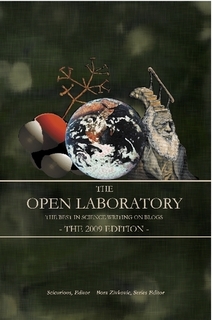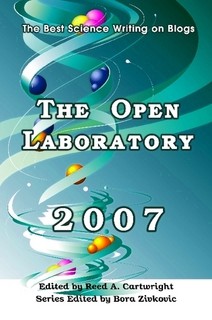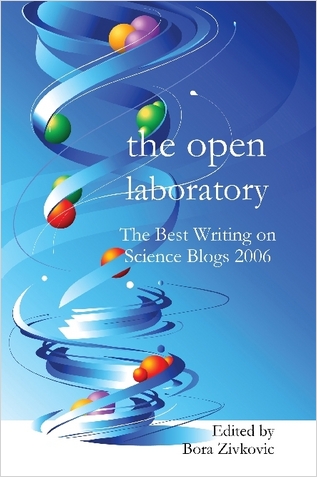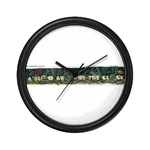Elia Ben-Ari, on her 'To Be Determined' blog, wrote an excellent, thought-provoking post on the fine distinctions between science journalists and Press Information Officers: More on the Science Journalism Ecosystem and What Is and Is Not Science Journalism
...And an understanding of the underlying science is certainly helpful in reporting the "something smells fishy" stories as well as the "wow, that's neat" stories. I maintain that one person can and may do both types of science reporting, so it doesn't make sense to separate "investigative journalism" from "science journalism."...
Interesting comments there as well....
Michael Tobis wrote three relevant posts related to this question on 'Only In It For The Gold' recently: Long Strange Trip:
...Science journalism in the future will mostly be conducted by scientists....
Michael Tobis again: Does Science Even Matter?
My position is first, that science can no longer depend on the press, or the institutional press office, or pop science media to get important messages out. That much has become blazingly obvious. Second, that certain messages of science are necessary to sound governance, that science is a crucial component of collective decision making in modern society. As a conclusion, it is necessary for science as a culture to participate directly in public communication. It may not be possible for science as an institution to do so. Consequently science as a culture may need to create new institutions and certainly new career paths to more effectively participate in consequential public discourse.
Michael Tobis yet again: Loose Cannon in the Press Office?
If there are temptations about to misrepresent science, it is the responsibility of scientists to stop them. Looking at the matter from the point of view of the young career-seeker, apparently there are two career paths for "science writers"; one being science journalism and the other being the "PIO" or "Press Information Officer" for a scientific research institution. The failures of the first have been crucial to our recent problems, but we should spare a moment to consider the second group.
Of course, we can answer questions 'is A or B journalism' only if we agree on the definition of journalism. So, Mike Orcutt at 'Meta-Morph It', asks us to help define it: Explanation:
How can we have a discussion about the journalism's role before we discuss what journalism -- either in general or specifically within the context of science communication -- is? A conversation between a scientist and journalist, about the journalist's role in the communication of science, can be productive only if the interested parties work together to determine a mutually-held definition of the term in question.
Finally, Paul Raeburn at KSJT thinks that support for Charlotte Observer's and Raleigh News&Observer;'s science pages by Duke Energy is fishy: Questioning 'NPR-like' funding for newspaper science section:
Thames said he began a search for "someone in the local community" who would underwrite a science section. That helpful community resident turned out to be Duke Energy, one of the largest energy companies in the nation.
Strange! Newspapers have been lamenting that advertisers, their only source of income, have been leaving them in droves thus precipitating lay-offs and bankruptcies across the industry. And now that one of them decides to come back and throw some pennies, that's a problem?
OK, let me try an analogy. This is like if my rich Uncle Joe was the only one giving me start-up money for my new business. Let's say it's a family newspaper. He writes me a nice, big check that can cover a year's effort, and in return he wants me to place his ads in it for free. Uncle Joe is an interesting fella, like any family will have. He can be nice and generous. And then he can say something awful. Or he keeps voting for that other, wrong, party every election day....
So, funded for the year, I get started with my newspaper. Then, one day, I say something mean about Uncle Joe in my newspaper. He probably does not read it. If he does, he probably looks down at it and laughs, but thinks it is his duty as a rich member of the family to help out nieces and nephews get on their feet and become independent. If he goes mad, that is just bad business sense on his part - he cannot get his money back (that was the deal, signed by both) and if he says/does something nasty, he just gets slammed harder in the next issue. To which rich Aunt Matilda responds, with glee (she hates Uncle Joe), by promising money for my 2nd year in business ;-)
Duke Energy is local. It is like a funky rich Uncle around here. The first one to ask for money. If that does not work, there are other rich uncles around....















Comments
The problem is not having one rich uncle, or many rich uncles or even whether there are more rich relatives out there. The problem Raeburn was getting at was the perceived, or real, issue of the paper being beholden to whichever special interest is underwriting them -- and having that special interest affect the news objectivity. I'd be shocked if the newspaper editors did not discuss this. However, this is not exactly new under the sun. I think Raeburn just felt like he needed to poke the story from the contrarian end of the spectrum because the CJR piece was so positive. But over time I think the model the Observer adopted will bear out and hold true. I also think that some people just like to complain, no matter what.
Posted by: DeLene | March 16, 2010 9:19 AM
Thanks for the links!
I absolutely agree that the NPR model is good, and likely the best we can do.
Note that a noncommercial radio station can mostly live on subscribers and very small grants. The bootstrap can be somewhat expensive but I think once people understand that a service needs to be paid for, they can manage to get it paid for, especially if the key audience tends to the smart and conscientious.
Posted by: Michael Tobis | March 16, 2010 3:00 PM
Journalism, not unlike books, movies and paintings, produces brain food. The production costs can be borne different ways: A rich uncle, which is the modern-day version of a cardinal or royal commissioning a piece of art; foundations, which are driven by a mission; advertisers, which are driven by profits; or readers.
Unless you can measure the value of a journalistic piece by the quality of its information and then charge each reader appropriately, there is no funding play that comes even close to being free of potential influence peddling.
We wouldn't be discussing funding tomorrow's journalism if we had the business model for such a pure play figured out.
Posted by: Sabine Vollmer | March 16, 2010 3:00 PM